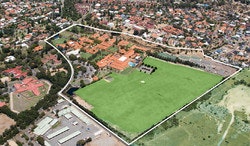Year 11 Italian: Second Language ATAR Course
The Year 11 syllabus is divided into two units (Units 1 and 2) each of one semester duration, which are typically delivered as a pair. The notional time for each unit is 55 class contact hours.
Unit 1
This unit focuses on Rapporti (Relationships). Through the three topics: Rapporti in famiglia, tra gli amici e a scuola (Family, friend and school relationships), Le tradizioni, gli spettacoli e le feste (Traditions, events and celebrations) and Communicare nel mondo moderno (Communicating in a modern world), students further develop their communication skills in Italian and gain a broader insight into the language and culture.
|
LEARNING CONTEXTS
|
TOPICS
|
|
The individual
Students explore aspects of their personal world, aspirations, values, opinions, ideas and relationships with others. They also study topics from the perspectives of other people.
|
Rapporti in famiglia, tra gli amici e a scuola (Family, friend and school relationships)
Students reflect on the different relationships in their lives and consider the importance of friendship in their lives and the lives of young Italians.
|
|
The Italian‐speaking communities
Students explore topics from the perspectives of individuals and groups within those communities, or the communities as a whole, and develop an understanding of how culture and identity are expressed through language.
|
Le tradizioni, gli spettacoli e le feste (Traditions, events and celebrations)
Students explore Italian traditions, events and celebrations, and how these promote a sense of community and an awareness of culture.
|
|
The changing world
Students explore information and communication technologies and the effects of change and current issues in the global community.
|
Communicare nel mondo moderno (Communicating in a modern world)
Students consider how the internet, mobiles, social networking and other technologies impact on the lives of young people around the world.
|
Unit 2
This unit focuses on Andiamo! (Travel - let's go!). Through the four topics: Le vacanze ‐ racconti e progetti (My holiday tales and plans), Destinazione Italia (Destination Italy), Destinazione Australia (Destination Australia) and Viaggiare oggi (Travel in a modern world), students extend their communication skills in Italian and gain a broader insight into the language and culture.
|
LEARNING CONTEXTS
|
TOPICS
|
|
The individual
Students explore aspects of their personal world, aspirations, values, opinions, ideas, and relationships with others. They also study topics from the perspectives of other people.
|
Le vacanze ‐ racconti e progetti (My holiday tales and plans)
Students reflect on their own holiday tales and discuss what is essential when planning a trip and travelling at home and/or abroad.
Destinazione Italia (Destination Italy)
Students explore travelling in a particular Italian region or city and explore tourist attractions and cultural experiences.
|
|
The Italian‐speaking communities
Students explore topics from the perspectives of individuals and groups within those communities, or the communities as a whole, and develop an understanding of how culture and identity are expressed through language.
|
Destinazione Australia (Destination Australia)
Students explore Australia as a destination for Italian‐ speaking travellers and discuss how they would prepare an Italian speaker for a trip to Australia.
|
|
The changing world
Students explore information and communication technologies and the effects of change and current issues in the global community.
|
Viaggiare oggi (Travel in a modern world)
Students consider how technology is changing world travel, influencing how people plan their holidays and communicate while they are away.
|
Assessment Table - Year 11
|
TYPE OF ASSESSMENT
|
WEIGHTING
|
|
Oral communication
Interaction with others to exchange information, ideas, opinions and/or experiences in spoken Italian. This can involve participating in an interview, a conversation and/or a discussion. Typically these tasks are administered under test conditions.
|
20%
|
|
Response: Listening
Comprehension and interpretation of, and response in English to, a range of Italian spoken texts, such as interviews, announcements, conversations and/or discussions. Typically these tasks are administered under test conditions.
|
15%
|
|
Response: Viewing and reading
Comprehension and interpretation of, and response in English to, a range of Italian print and/or audiovisual texts, such as emails, blog postings, films/television programs (excerpts), letters, reviews and/or articles. Typically these tasks are administered under test conditions.
|
15%
|
|
Written communication
Production of written texts to express information, ideas, opinions and/or experiences in Italian. This can involve responding to a stimulus, such as a blog posting, an email and/or a chart, or writing a text, such as a journal/diary entry, an account, a review, a summary and/or an email. Typically these tasks are administered under test conditions.
|
20%
|
|
Practical (oral) examination
Typically conducted at the end of each semester and/or unit. In preparation for Unit 3 and Unit 4, the examination should reflect the examination design brief included in the ATAR Year 12 syllabus for this course.
|
10%
|
|
Written examination
Typically conducted at the end of each semester and/or unit. In preparation for Unit 3 and Unit 4, the examination should reflect the examination design brief included in the ATAR Year 12 syllabus for this course.
|
20%
|
